Local SEO software plays a crucial role in helping businesses improve their visibility within specific geographic areas. It offers a variety of tools designed to optimize local search rankings, manage online reviews, and track performance in search results. These solutions are essential for businesses aiming to attract customers in their immediate vicinity.
The best local SEO software streamlines multiple tasks, allowing businesses to efficiently manage their online presence and increase local customer engagement. Choosing the right software can help a business stay competitive by enhancing its visibility on search engines, social profiles, and mapping services. This article explores the key features and benefits of leading local SEO tools available today.
1) Localrank.so
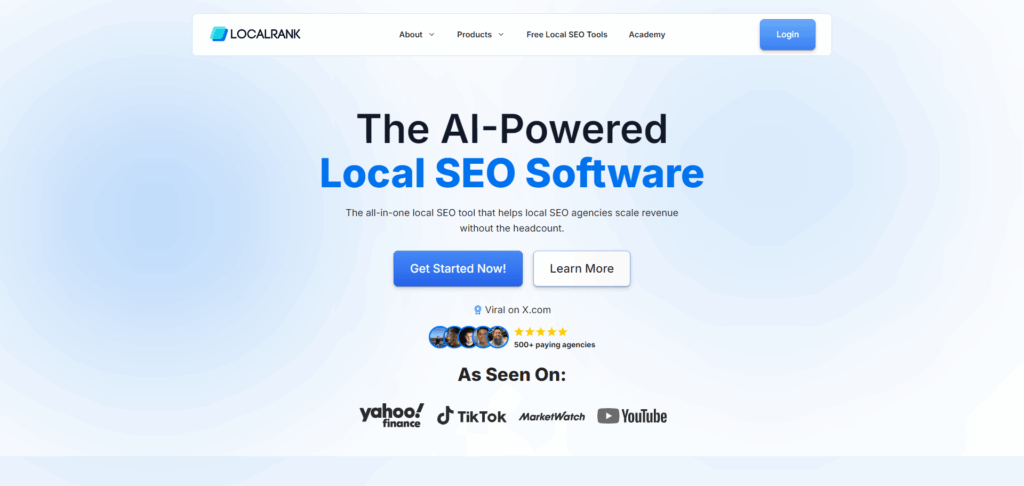
Localrank.so is a local SEO software designed to help businesses monitor search performance across multiple geographic areas. It allows users to create campaigns targeting specific locations, with tailored keywords assigned to each area for precise rank tracking.
The platform emphasizes ease of use, offering a straightforward interface that helps users focus on key local SEO metrics. Its rank tracking capability is valuable for detecting trends and fluctuations in local search results.
By providing detailed insights into local rankings, Localrank.so supports businesses in maintaining a competitive edge. It enables quick adaptation to changing market conditions and improves understanding of local search dynamics.
2) Google Business Profile

Google Business Profile (GBP), previously known as Google My Business, is a fundamental local SEO tool. It allows businesses to manage their presence on Google Search and Google Maps easily. This free platform helps users create and update their business listings.
With GBP, businesses can display key information like addresses, hours, and contact details. They can also post updates, respond to reviews, and upload photos. This interaction improves local search visibility and customer engagement.
The tool is crucial for appearing in the local pack, the boxed results that show nearby businesses. It supports features like booking services or messaging directly from the listing.
Given its integration with Google’s ecosystem, it offers reliable performance for local SEO strategies. Businesses rely on GBP because it provides essential metrics and insights to track online interactions and customer behavior.
Overall, Google Business Profile remains one of the best starting points for local SEO efforts. Its ease of use, along with being cost-free, makes it accessible to businesses of all sizes.
3) BrightLocal
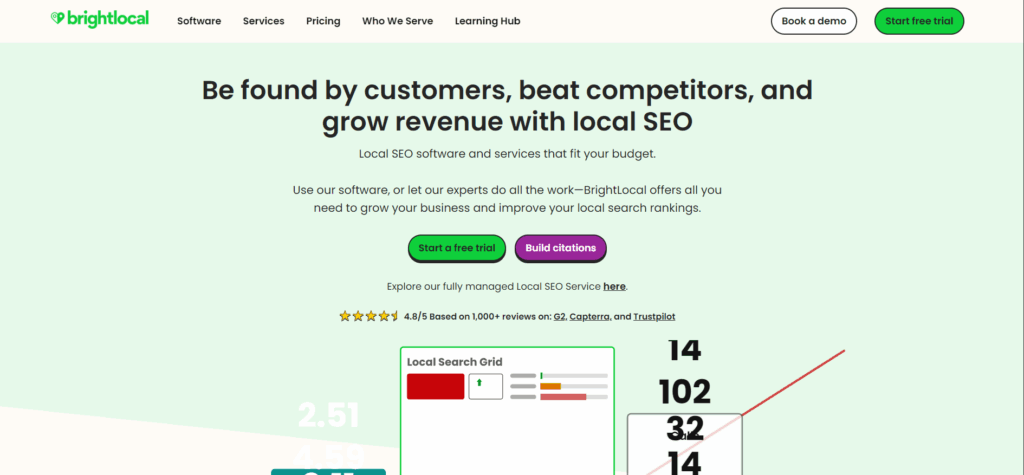
BrightLocal is designed to support small businesses, agencies, and brands focusing on local search marketing. It provides tools for citation building, local rank tracking, SEO audits, and reputation management.
The software excels at monitoring and maintaining consistent business information across multiple directories. This helps improve local search visibility by ensuring accurate citations and managing online reviews effectively.
BrightLocal also offers detailed reporting and analytics that give users insights into their local SEO performance. While it is user-friendly and offers a 14-day free trial, it may lack some advanced features needed by larger teams or those requiring scalable workflows.
Agencies benefit from its white-label services, allowing customized SEO delivery for clients. Overall, BrightLocal offers a balanced mix of DIY software with options for managed services, helping users maintain control over their local SEO campaigns.
4) Rank Math
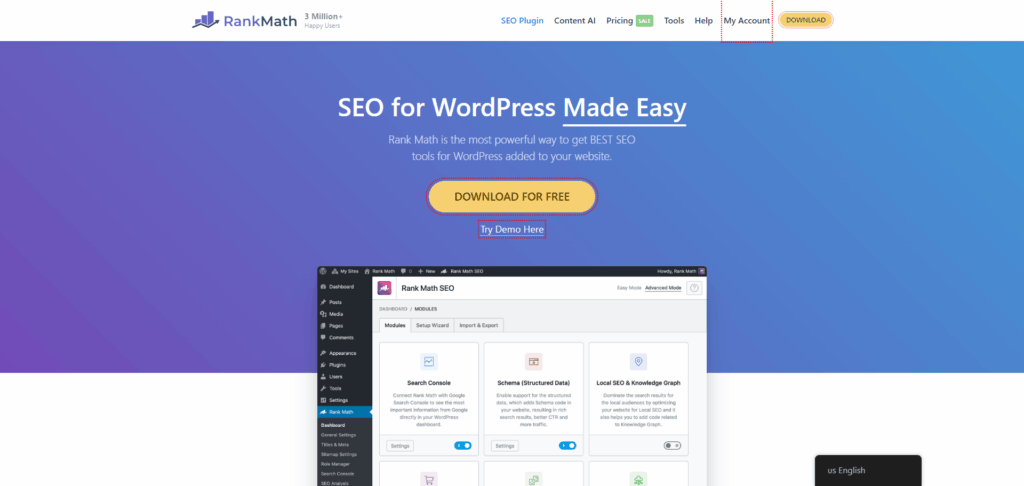
Rank Math is a powerful SEO tool known for its strong local SEO features. It helps businesses improve their visibility in local search results through effective management of business location data and optimized schema markup.
The tool supports multiple business locations, allowing users to create and manage location-specific pages. This makes it easier for companies with several branches to maintain consistent and accurate local SEO.
Rank Math also offers rank tracking capabilities that store data securely on local servers. This approach enhances data privacy without compromising the accuracy of performance monitoring.
Its user interface is designed to be accessible for both beginners and experienced SEO professionals. It integrates well with popular platforms and provides actionable insights to improve local search rankings.
5) Whitespark
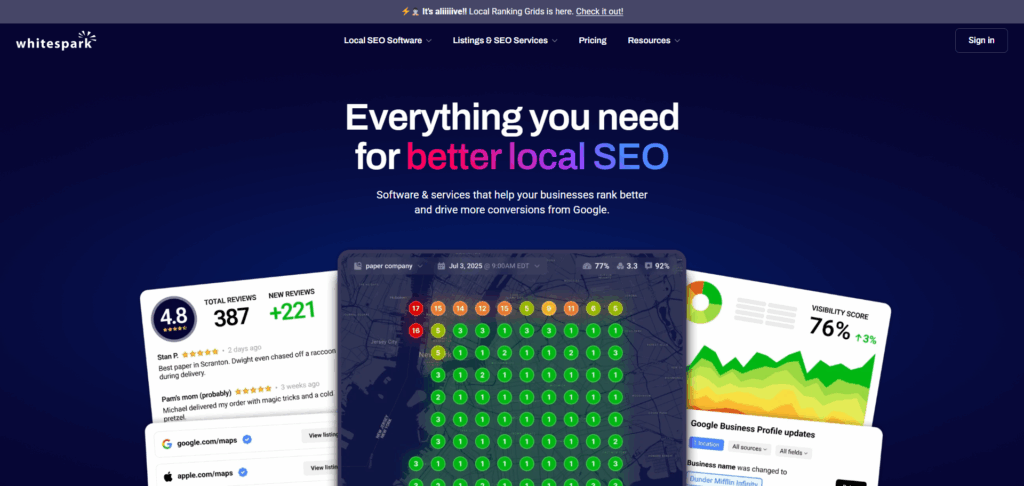
Whitespark is a local SEO platform designed to help businesses improve their visibility in local search results. It offers a range of tools such as Local Rank Tracker, Citation Finder, and Reputation Builder. These tools assist with managing Google Business Profiles and tracking local keyword rankings.
The platform also provides services like citation building and listings cleanup. These features help maintain accurate business information across the web, which is critical for local SEO success. Whitespark’s reputation management tools support monitoring and improving online reviews.
Whitespark suits small to mid-sized businesses and agencies focused on local marketing. It emphasizes user-friendly features without overwhelming the user with complexity. Support is noted for being responsive and personalized rather than canned or scripted.
Pricing varies based on the tools and services chosen. Whitespark competes with other local SEO platforms by offering a good balance of features and ease of use, particularly in citation management and local rank tracking.
6) SEMrush Local SEO Toolkit
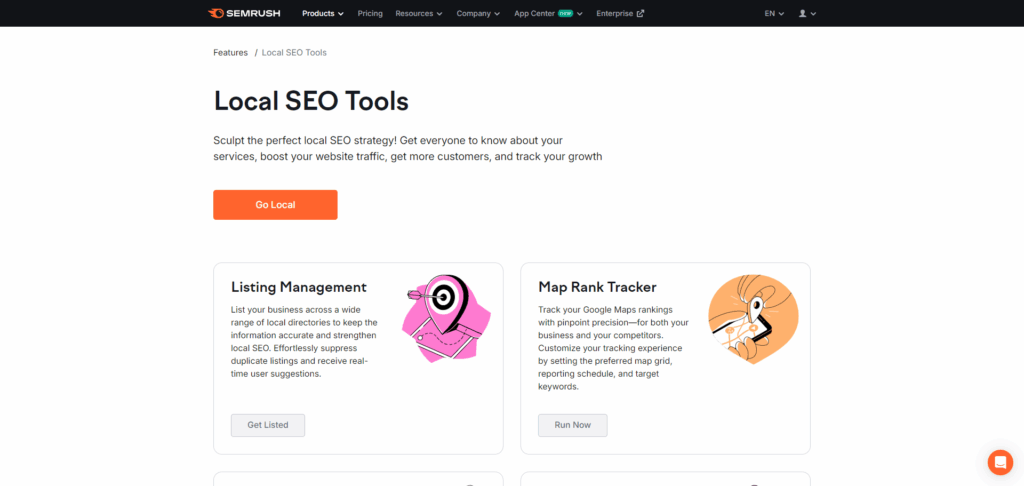
The SEMrush Local SEO Toolkit provides a comprehensive set of tools designed to help businesses improve their local search presence. It covers key areas such as managing business listings, tracking online reviews, and analyzing local search visibility.
Users can monitor their citations across various directories to ensure consistent and accurate business information. The toolkit also allows tracking of local rankings, making it easier to assess performance over time.
Additionally, it offers review management features that help businesses respond to customer feedback promptly. This can enhance their reputation and attract more local customers.
SEMrush Local is praised for its user-friendly interface and integration with other SEMrush tools. Its features support both small businesses and regional marketers aiming to boost local search visibility with reliable data and actionable insights.
Pricing options reflect flexibility, making it accessible for various business sizes. Its AI-powered capabilities enhance the efficiency of local SEO efforts without overwhelming users with complexity.
7) Moz Local
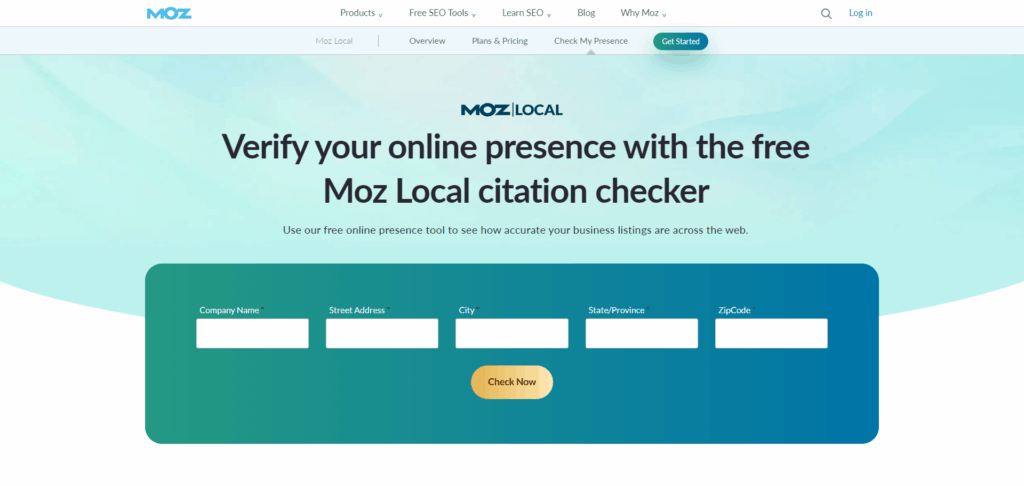
Moz Local is a tool designed to improve local search visibility by managing and updating business listings across multiple directories. It helps businesses maintain accurate and consistent data, which is essential for local SEO performance.
The platform monitors listing health and tracks how these listings impact search rankings. Moz Local also integrates with major review sites like Google My Business and Facebook, allowing users to manage reputation alongside listings.
Users benefit from an easy-to-use interface focused on listing management and local SEO auditing. While it may not offer the in-depth analytics of some competitors, it provides a straightforward solution for businesses aiming to boost local visibility.
Moz Local supports ongoing tracking of search performance and streamlines the optimization process. This makes it suitable for small to mid-sized businesses looking for simple, effective local SEO software without excessive complexity or cost.
8) Yext
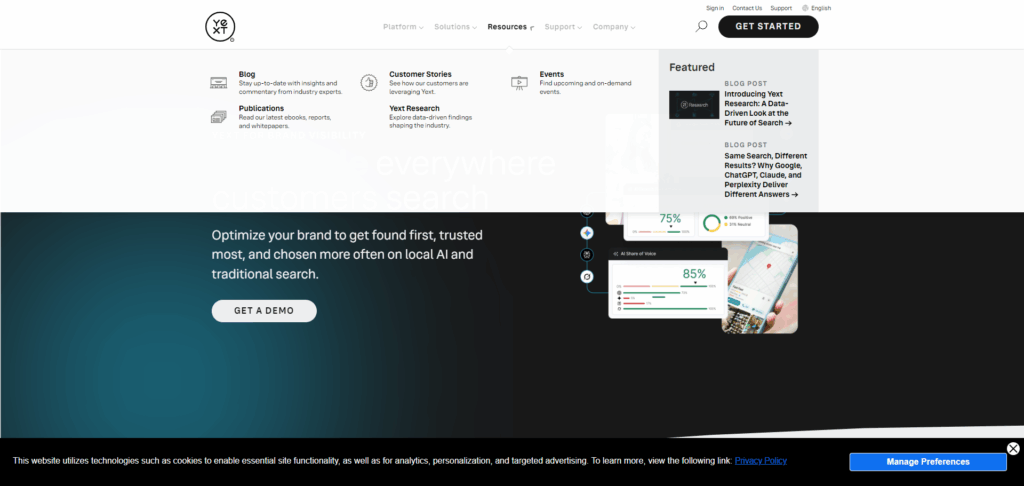
Yext is a digital location management platform designed to help businesses improve local search visibility. It focuses on managing business listings across multiple directories, ensuring consistent and accurate information online.
The software offers citation management, review monitoring, and analytics. This allows businesses to optimize their local SEO strategy methodically and track performance.
Yext serves companies of various sizes but is especially suitable for larger organizations with a wider geographic reach. It supports multiple locations and integrates with numerous search platforms.
Users benefit from automated updates, reducing manual work and enhancing accuracy. Yext is often compared to other local SEO tools like Moz Local and BrightLocal but stands out for its comprehensive location management features.
Pricing can vary, typically reflecting the scale of businesses and the number of locations managed. It’s considered a strong option for those needing robust control over their local search presence.
9) Synup
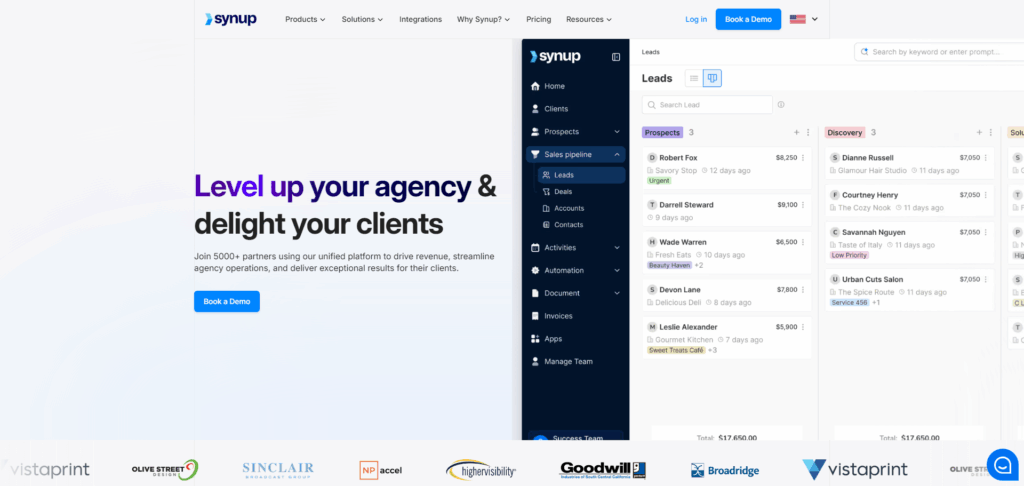
Synup is a cloud-based local SEO platform that helps businesses manage their online presence and reputation. It centralizes listings management, ensuring business information stays consistent across many directories.
The software offers tools for local listings, reputation monitoring, and social media publishing. It is designed to simplify local SEO tasks, especially for small to medium-sized businesses and marketing agencies.
Synup’s operating system allows agencies to scale services by combining listings, reputation, and social media management into one dashboard. This unified approach can improve efficiency and client retention.
One notable feature is its AI-powered capability to automate SEO updates and manage multi-location brands across 40+ platforms. This helps businesses maintain visibility and engage customers more effectively.
Synup focuses on streamlined local listings and reputation management. It may not provide as deep SEO insight as some competitors but excels in operational simplicity and multi-channel presence management.
10) ReviewTrackers
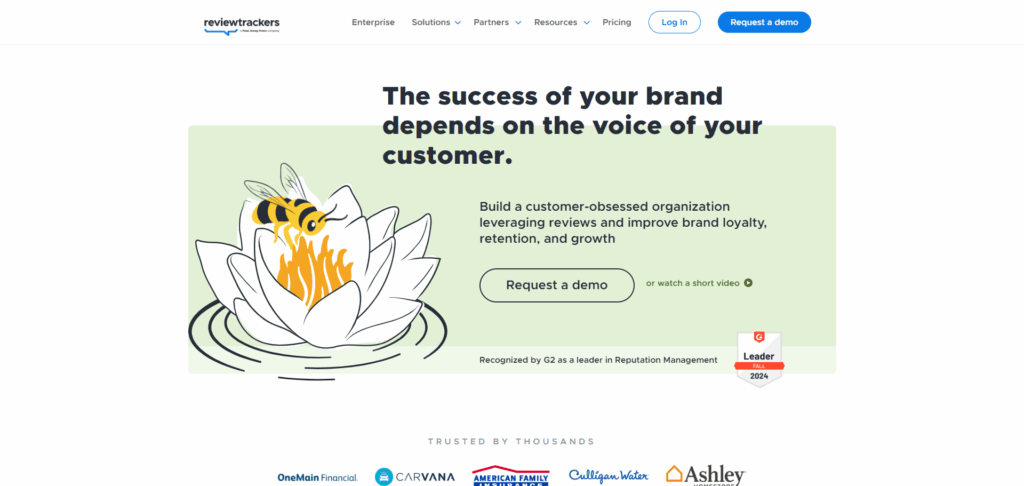
ReviewTrackers is a reputation management platform designed to help businesses monitor and respond to customer reviews across multiple sites. It allows users to track keywords and competitor activity, providing insights to improve local SEO efforts.
The software supports customer experience analysis, helping businesses understand buyer sentiment. This data can guide marketing strategies and improve service quality.
It also offers tools for managing local business profiles and optimizing search presence. ReviewTrackers integrates AI-driven review summaries to save time on analyzing feedback.
By focusing on review monitoring and competitive analysis, it helps companies strengthen their local rankings. It is particularly useful for businesses aiming to enhance online reputation and search visibility simultaneously.
Key Features of Effective Local SEO Software
Strong local SEO software focuses on simplifying key tasks that impact local search visibility. It helps manage business information across directories, tracks search rankings in specific areas, and handles customer reviews efficiently.
Automated Citation Management
Automated citation management ensures business information—name, address, phone number—is consistent across numerous local directories. This consistency supports search engines in verifying legitimacy and improves local rankings. The software scans major citation sources and submits or updates listings automatically.
It reduces manual work by handling duplicates and incorrect listings proactively. Some tools also provide detailed reports showing citation status and errors that require attention.
Effective citation management integrates with platforms like Google Business Profile and key directories, ensuring the business stays current and accurate everywhere it appears online.
Local Rank Tracking Capabilities
Local rank tracking monitors a business’s position in search engine results for location-specific queries. This feature provides daily or weekly updates on keyword rankings in targeted geographic areas.
Tracking includes insight on competitors’ rankings to guide strategy adjustments. It often supports multiple locations and device types, showing differences between desktop and mobile search results.
Users can view historical ranking trends through clear dashboards, which help identify what SEO efforts are working or need change. Alerts notify users of significant ranking drops or improvements.
Review Monitoring and Response Tools
Monitoring reviews is critical in local SEO, as customer feedback directly affects online reputation and rankings. Effective tools gather reviews from platforms like Google, Yelp, and Facebook in one dashboard.
They highlight new reviews, enabling prompt responses that maintain customer engagement. Automated alerts notify the business of negative feedback to address issues quickly.
Advanced software may offer response templates, sentiment analysis, and performance metrics tied to review activity. This streamlines reputation management and encourages positive customer interactions consistently.
How to Measure the ROI of Local SEO Tools
Measuring the ROI of local SEO tools involves connecting improvements in online visibility with actual business outcomes. It requires tracking search performance and linking that data to customer actions and revenue.
Tracking Local Search Visibility
Local SEO tools track rankings on search engines, focusing on local keywords and geographic relevance. Monitoring changes in local pack rankings, map placements, and keyword positions helps assess whether visibility is improving over time.
These tools also track citations, reviews, and Google Business Profile metrics. Consistent monitoring of these data points reveals how well the business appears in local searches compared to competitors.
By quantifying improvements in search visibility, businesses can estimate potential increases in foot traffic or website visits. This establishes a baseline view of how well the SEO efforts capture the target local audience.
Analyzing Lead and Conversion Data
Measuring ROI extends beyond visibility to tracking leads generated and conversions. Local SEO software often integrates with analytics or CRM systems to capture calls, form submissions, and appointment bookings originating from local search listings.
Businesses should focus on tracking specific conversion metrics tied to local SEO efforts, such as phone inquiries or completed purchases linked to search campaigns. Accurate lead attribution is crucial to calculating revenue generated by local traffic.
Using data like cost per lead and conversion rates helps determine the financial return of local SEO investments. This analysis enables marketers to adjust strategies and software use based on measurable business impact, not just search rankings.
Frequently Asked Questions
Local SEO software focuses on optimizing local search presence through targeted keyword tracking, citation management, review monitoring, and Google Business Profile optimization. Effective tools also provide ranking reports and automate listing consistency to improve search visibility.
What are the key features to look for in local SEO software?
Key features include local keyword tracking, citation and listing management, review monitoring, and Google Business Profile integration. Reporting and analytics capabilities are essential for measuring performance and adjusting strategies.
Automation for business listing updates and rank tracking across multiple locations helps businesses maintain consistency and monitor changes efficiently.
How does local SEO software improve Google My Business rankings?
Local SEO tools optimize Google Business Profile information by managing accurate and consistent listings across directories. They help businesses respond to and gather customer reviews, improving engagement signals.
Regular updates, keyword-optimized descriptions, and monitoring of Google’s ranking factors contribute to better local pack visibility.
Can you recommend tools specifically for managing local SEO citations?
BrightLocal and Whitespark are recognized tools focused on managing local SEO citations. They help businesses find citation opportunities and maintain consistency across numerous directories.
These tools automate citation submissions and audit existing listings to reduce errors and duplicates.
What is the best way to track local keyword rankings?
Using software like Localrank.so or Rank Math enables precise rank tracking tailored for multiple locations and customized search intents. These tools provide daily or weekly updates on keyword positions.
Tracking can be refined by device, location radius, and search type to understand competitive performance thoroughly.
How do AI tools contribute to local SEO strategies?
AI-powered tools assist in keyword research by identifying trending and low-competition terms automatically. They also help in generating optimized content and automating response management for customer reviews.
By analyzing large data sets, AI tools improve prediction accuracy for ranking shifts and local search trends.
What should be included in an effective local SEO plan?
An effective plan integrates consistent business NAP (Name, Address, Phone) listings, optimized Google Business Profiles, and regular review engagement. It also includes targeted local keyword research and ongoing rank tracking.
Monitoring competitors and adapting to algorithm changes ensure sustained local search performance.
